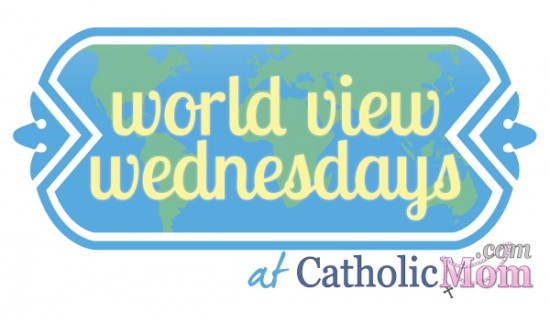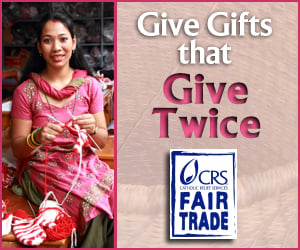
Psst! You.
Yes, you.
Have you heard?
Christmas is nearing.
I know, I know. I hear your collective groans through this digital space.
It's not even Thanksgiving yet. Shoot, it's not even Halloween yet! What's the rush, Schmidt? How about you prayerfully enter into Advent before mentioning Christmas!
Touché.
But may I please have some latitude just this once? I promise it's for an important cause. Given this is my final World View Wednesday column in 2014, I'm taking the opportunity to promote Fair Trade shopping for the holidays.
First things first, some definitions. {Disclaimer, I took an entire course on Fair Trade policies in grad school while studying for my MPA, so my apologies for the overzealousness that's sure to follow!}
 What's Fair Trade?
What's Fair Trade?
Fair Trade is a philosophy that fosters empowerment and improved quality of life for artisan producers through trade partnerships among producers, retailers, and consumers. Artisans are people living in less or under-developed nations who eke out their livelihood by producing a variety of handcrafts to be sold worldwide. Sixty to seventy-percent of these artisans are women, who are often mothers and the sole wage earners in the home.
Alternative trade organizations (ATOs) are the businesses who work directly with artisan groups on product design, quality control, management, and shipping of products; they bridge together the producers, retailers, and customers of the global market. Many of the United States-based ATOs market food products such as coffee, tea and spices, and handcrafts such as clothing, utensils, bowls, and baskets. These handcrafts provide a window into the heart of a culture and help to foster an appreciation for other cultures worldwide.
Simply, Fair Trade is about making a tremendous impact on artisan and farmer communities while offering great products to the public.
Why Fair Trade?
“The economy should serve people, not the other way around.” --- U.S. Conference of Catholic Bishops
As detailed in CRS' Fair Trade and Catholic Social Teaching document, each of us is called to do our part as consumers to ensure that the economy works for everyone. Everyone. In Caritas in Veritate, Pope Benedict XVI reminds us that as consumers we have a specific social responsibility:
It is good for people to realize that purchasing is always a moral---and not simply---economic act. Hence the consumer has a specific social responsibility, which goes hand-in-hand with the social responsibility of the enterprise.” (no. 66)
Fair Trade creates opportunities for us to respond to this call in a small but significant way through the choices we make as consumers. When we buy Fair Trade items, we are putting the values of Catholic social teaching into action. Fair Trade recognizes the dignity of the work performed by traditional artisans and farmers, and ensures that they are fairly compensated. When we choose Fair Trade products, we are exercising a preferential option for the poor.
Where Can I Buy Fair Trade Merchandise?
How do I count the ways! There are trade organizations aplenty committed to spreading the values of Fair Trade to economically disadvantaged areas worldwide. Here are a few entry points to help you get a jumpstart on your shopping.
- Catholic Relief Services Fair Trade: CRS works in partnership with fifteen Fair Trade partners to bring crafts, coffee, and chocolate to thousands of communities across the United States.
- Fair Trade Federation: Use the search option here to find a Fair Trade Federation store/café in your community dedicated to selling Fair Trade merchandise. With your purchase, not only are you raising global consciousness of Fair Trade practices, but by shopping locally, you are supporting your community as well.
- Accessorize with Opportunity: In her recent World View Wednesday post, CatholicMom contributor Colleen Mitchell shared a few of her Fair Trade Favorites.
- Host a party: There are several options to host Tupperware®-style parties, just substitute the famous storage-ware for Fair Trade jewelry, scarves, and baskets. In the coming weeks, I'm attending a Trades of Hope party and an Esther's Hope Trunk Show. Both organizations give children and women a chance for a better future.
What are your favorite Fair Trade resources? I'm looking forward to reading your suggestions in the comments.
Copyright 2014, Lisa Schmidt
About the Author

Guest
We welcome guest contributors who graciously volunteer their writing for our readers. Please support our guest writers by visiting their sites, purchasing their work, and leaving comments to thank them for sharing their gifts here on CatholicMom.com. To inquire about serving as a guest contributor, contact editor@CatholicMom.com.


.png?width=1806&height=731&name=CatholicMom_hcfm_logo1_pos_871c_2728c%20(002).png)
Comments